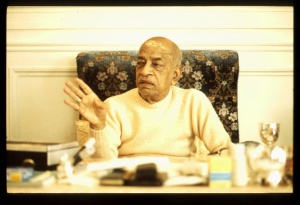CC Adi 7.99 (1975)

A.C. Bhaktivedanta Swami Prabhupada
TEXT 99
- prabhura miṣṭa-vākya śuni' sannyāsīra gaṇa
- citta phiri' gela, kahe madhura vacana
SYNONYMS
prabhura—of the Lord; miṣṭa-vākya—sweet words; śuni'-after hearing; sannyāsīra gaṇa—all the groups of sannyāsīs; citta—consciousness; phiri'-moved; gela—went; kahe—said; madhura—pleasing; vacana—words.
TRANSLATION
After hearing Lord Śrī Caitanya Mahāprabhu, all the Māyāvādī sannyāsīs were moved. Their minds changed, and thus they spoke with pleasing words.
PURPORT
The Māyāvādī sannyāsīs met Caitanya Mahāprabhu at Vārāṇasī to criticize the Lord regarding His participation in the saṅkīrtana movement, which they did not like. This demonic nature of opposition to the saṅkīrtana movement perpetually exists. As it existed in the time of Śrī Caitanya Mahāprabhu, similarly it existed long before that, even in the time of Prahlāda Mahārāja. He used to chant in saṅkīrtana although his father did not like it, and that was the reason for the misunderstanding between the father and son. In the Bhagavad-gītā (BG 7.15) the Lord says:
- na māṁ duṣkṛtino mūḍhāh
- prapadyante narādhamāḥ
- māyayāpahṛta-jñānā
- āsuraṁ bhāvam āśritāḥ
"Those miscreants who are grossly foolish, who are lowest among mankind, whose knowledge is stolen by illusion, and who partake of the atheistic nature of demons do not surrender unto Me." The Māyāvādī sannyāsīs are āsuraṁ bhāvam āśritāḥ, which means that they have taken the path of the asuras (demons), who do not believe in the existence of the form of the Lord. The Māyāvādīs say that the ultimate source of everything is impersonal, and in this way they deny the existence of God. Saying that there is no God is direct denial of God, and saying that God exists but has no head, legs or hands and cannot speak, hear or eat is a negative way of denying His existence. A person who cannot see is called blind, one who cannot walk can be called lame, one who has no hands can be called helpless, one who cannot speak can be called dumb, and one who cannot hear can be called deaf. The Māyāvādīs' proposition that God has no legs, no eyes, no ears and no hands is an indirect way of insulting Him by defining Him as blind, deaf, dumb, lame, helpless, etc. Therefore although they present themselves as great Vedāntists, they are factually māyayāpahṛta-jñāna; in other words, they seem to be very learned scholars, but the essence of their knowledge has been taken away.
Impersonalist Māyāvādīs always try to defy Vaiṣṇavas because Vaiṣṇavas accept the Supreme Personality as the supreme cause and want to serve Him, talk with Him and see Him, just as the Lord is also eager to see His devotees and talk, eat and dance with them. These personal exchanges of love do not appeal to the Māyāvādī sannyāsīs. Therefore the original purpose of the Māyāvādī sannyāsīs of Benares in meeting Caitanya Mahāprabhu was to defeat His personal conception of God. Śrī Caitanya Mahāprabhu, however, as a preacher, turned the minds of the Māyāvādī sannyāsīs. They were melted by the sweet words of Śrī Caitanya Mahāprabhu and thus became friendly and spoke to Him also in sweet words. Similarly, all preachers will have to meet opponents, but they should not make them more inimical. They are already enemies, and if we talk with them harshly or impolitely their enmity will merely increase. We should therefore follow in the footsteps of Lord Caitanya Mahāprabhu as far as possible and try to convince the opposition by quoting from the śāstras and presenting the conclusion of the ācāryas. It is in this way that we should try to defeat all the enemies of the Lord.